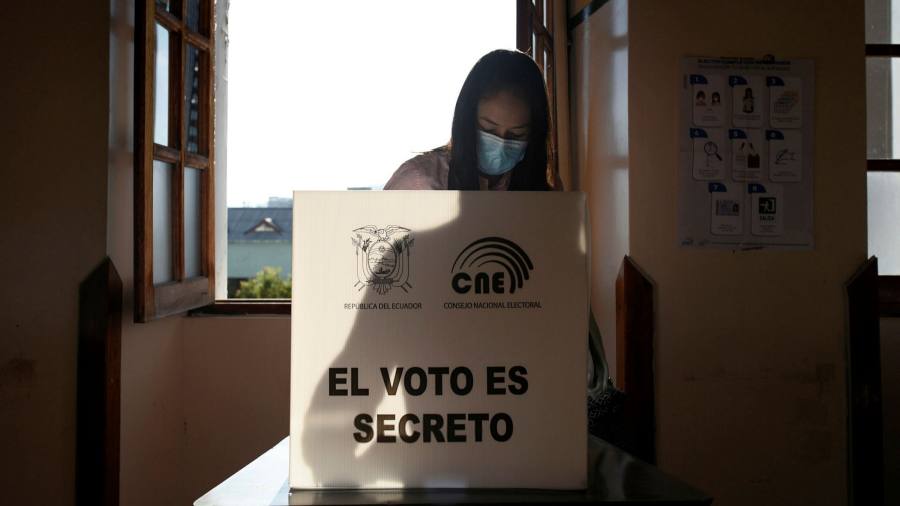[ad_1]
Ecuadorians went to the polls to choose a new president on Sunday in an unpredictable election that will shape the country’s relationship with the IMF and bondholders.
Opinion polls have been erratic in the run-up to the vote but most put leftwing candidate Andrés Arauz ahead. His main challengers are Guillermo Lasso, a millionaire former banker and ex-Coca-Cola executive, and Yaku Pérez, bidding to become the Andean nation’s first indigenous president. The incumbent, LenÃn Moreno, is not standing again.
“The numbers have been really difficult to read,†said 46-year-old Cristóbal Montenegro after casting his ballot in central Quito on Sunday morning. “I always knew who I was going to vote for — I voted for Lasso — but a lot of people seem to be undecided.â€
Paulina Recalde, director of Perfiles de Opinión, a local pollster, said 30 per cent of people claimed to have not made up their mind who to vote for in the days before the election, 5 percentage points higher than usual.
At stake is Ecuador’s economic future. Last year, the country — one of the poorest in South America — took steps towards putting its indebted economy back on track, agreeing a $6.5bn lending agreement with the IMF and renegotiating the terms of its $17.4bn of sovereign debt with bondholders.
But Arauz said the IMF’s conditions were too onerous and he would not respect the agreement. The 36-year-old economist, who is backed by the country’s combative former president Rafael Correa, describes the deal with bondholders as unconstitutional.
“Whoever wins, sovereign debt risks will remain very high,†London-based Capital Economics said in a research note this week. “And the bond market could go into tailspin if . . . Arauz wins and follows through with his pledge to scrap IMF-mandated reforms.â€
In a campaign marked by extravagant offers and claims, Arauz has pledged $1,000 to 1m Ecuadorians within days of taking office to help them recover from the impact of the pandemic. Encouraging people to sign up for the offer on his website, he has vowed to use central bank money to finance the $1bn proposal, while pledging higher taxes for the rich and an increase in public spending to reboot an economy that shrank about 7 per cent last year due to the pandemic.
“Arauz is already promising to give away money but let’s be honest — we’re already massively in debt. We can’t afford giveaways,†said 47-year-old Magali González as she shopped for food on Saturday at Quito’s central market, which was far quieter than usual due to the pandemic.
Lasso said he would largely stick by the IMF and bondholder deals, although he has ruled out tax increases, even though the IMF has called for a tax reform worth 2.5 per cent of GDP this year. He has pledged to create 2m jobs in a country of 17.4m people and double national oil production over the medium term — both highly ambitious proposals.
“It feels like every candidate has been trying to out-do the other with their promises,†said Pedro Quispe, a public administrator, as he sat on a bench in the sunshine in Quito’s historic old town. “I don’t believe any of them.â€
To win the presidency, a candidate needs 50 per cent of the vote or 40 per cent plus a 10 per cent lead over their nearest rival. With 16 candidates in the race, that is a tall order. If no one reaches either threshold, the election will go to a second round in April.
“Our expectation is for Arauz to win in a run-off against Lasso, but . . . we don’t rule out an outright win by Arauz this Sunday,†said Marcos Casarin, chief Latin American economist at Oxford Economics.
Voting is mandatory in Ecuador and 13.1m people are registered, with fines of $40 for those who do not cast a ballot. Some local analysts have speculated that Lasso’s supporters, who tend to be wealthier, might pay the fine and stay at home due to fears of coronavirus.
Ecuador was one of the worst-hit countries in the world in the early months of the pandemic. Although it has fared slightly better in the second wave, the virus has killed 15,000 people. The state started vaccinating health workers in late January but most citizens have not been inoculated.
If Arauz wins, it will almost certainly mean the return to Ecuador of Correa, who is in exile in Belgium and has been sentenced to eight years in jail for corruption in his home country. Arauz has said he is confident the courts will drop the charges if he wins the presidency, and has said Correa will serve as a consultant to his government.
Correa left office in 2017 after a decade in which he brought political stability to a country that had lurched from one crisis to another in the previous decade. He ploughed money into infrastructure projects and funded social projects that helped the poor, but he left Ecuador heavily indebted to China through a series of opaque loans in exchange for oil.
Aside from choosing a new president, voters will be asked to elect 137 new members of congress, key to determining whether the country’s new leader has a working majority.
[ad_2]
Source link







